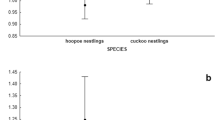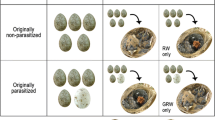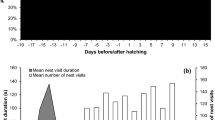Abstract
When brood parasites are about to lay an egg, they have to decide which nest to parasitize. The best nest in which to lay will depend on the parenting ability of the host. We have studied selection of magpie (Pica pica) hosts by great spotted cuckoos (Clamator glandarius). Great spotted cuckoos preferentially parasitize large host nests. Nest volume in magpies is a good indicator of territory quality, since there is a negative relationship between magpie nest size and breeding date, and timing of breeding in magpies is known to be positively related to territory quality. Moreover, magpies occupying high-quality territories have high breeding success. Therefore, nest size is positively related to the quality of magpies. Parasitized magpie nests were of greater volume than the nearest neighbouring nest not parasitized by the great spotted cuckoo. In order to test whether the great spotted cuckoos might select high-quality magpie hosts, we manipulated pairs of parasitized and non-parasitized nests with identical laying dates and habitats, introducing into each of the nests the same number of parasitic and non-parasitic eggs. The number of fledglings reared (magpie plus great spotted cuckoo chicks) in naturally parasitized nests was higher than in experimentally parasitized nests. Thus, the probability of survival of the parasite chicks increased if cuckoo eggs were laid in the nests of high-quality hosts originally chosen by the parasite.
Similar content being viewed by others
References
Baeyens G (1981) Functional aspects of serial monogamy: the magpie pair-bond in relation to its territorial system. Ardea 69:125–139
Birkhead TR (1991) The magpies. The ecology and behaviour of black-billed and yellow-billed magpies. Poyser, London
Brooke M de L, Davies NB (1988) Egg mimicry by cuckoos Cuculus canorus in relation to discrimination by host. Nature 335:630–632
Burley N (1986) Sexual selection for aesthetic traits in species with biparental care. Am Nat 127:415–445
Clutton-Brock TH (1991) The evolution of parental care. Princeton University Press, Princeton
Davies NB, Brooke M de L (1988) Cuckoos versus reed warblers: adaptation and counteradaptations. Anim Behav 36:262–284
Davies NB, Brooke M de L (1989) An experimental study of co-evolution between the cuckoo, Cuculus canorus and its host. I. Host egg discrimination. J Anim Ecol 58:207–224
Dawkins R, Krebs JR (1979) Arms race between and within species. Proc R Soc Lond B 205:489–511
Goodburn SF (1991) Territory quality or bird quality? Factors determining breeding success in the magpie Pica pica. Ibis 133:85–90
Högstedt G (1981) Effect of additional food on reproductive success in the magpie (Pica pica). J Anim Ecol 50:219–229
Krebs JR, Kacelnik A (1991) Decision-making. In: Krebs JR, Davies NB (eds) Evolutionary ecology. An evolutionary approach. Blackwell, Oxford, pp 105–168
Lack D (1968) Ecological adaptations for breeding birds. Chapman and Hall, London
Lotem A, Nakamura H, Zahavi A (1992) Rejection of cuckoo eggs in relation to host age: a possible evolutionary equilibrium. Behav Ecol 3:128–132
May RM, Robinson SK (1985) Population dynamics of avian brood parasitism. Am Nat 126:475–494
Maynard Smith J (1978) Optimization theory in evolution. Annu Rev Ecol Syst 9:31–56
Møller AP (1982) Characteristics of magpie Pica pica territories of varying duration. Ornis Scand 13:94–100
Moreno J, Soler M, Møller AP, Linden M (1994) The function of stone carrying in the black wheatear Oenanthe leucura. Anim Behav 47:1297–1309
Payne RB (1977) The ecology of brood parasitism in birds. Annu Rev Ecol Syst 8:1–28
Rothstein SI (1990) A model system for coevolution: avian brood parasitism. Annu Rev Ecol Syst 21:481–508
Siegel S, Castellan NJ (1988) Nonparametric statistics for the behavioral sciences, 2nd edn. McGraw-Hill, New York
Sokal RR, Rohlf FJ (1981) Biometry. The principles and practice of statistics in biological research. Freeman, New York
Soler M (1990) Relationships between the great spotted cuckoo Clamator glandarius and its magpie host in a recently colonized area. Ornis Scand 21:212–223
Soler M, Møller AP (1990) Duration of sympatry and coevolution between great spotted cuckoo and its magpie host. Nature 343:748–750
Soler M, Soler JJ (1991) Growth and development of great spotted cuckoos and their magpie host. Condor 93:49–51
Soler M, Soler JJ, Martinez JG, Møller AP (1994) Micro-evolutionary change in host response to a brood parasite. Behav Ecol Sociobiol 35:295–301
Soler M, Soler JJ, Martinez JG (in press a) Sympatry and coevolution between the great spotted cuckoo and its magpie host. In: Rothstein SI (ed) The ecology and evolution of brood parasitism.
Soler M, Soler JJ, Martinez JG, Møller AP (in press b) Magpie host manipulation by great spotted cuckoos: evidence for an avian mafia? Evolution
Zahavi A (1979) Parasitism and nest predation in parasitic cuckoos. Am Nat 113:157–159
Zahavi A (1987) The theory of signal selection and some of its implications. In: Delfino VP (ed) International symposium on biological evolution. Adriatica, Bari, pp 305–327
Zuñiga JM, Redondo T (1992) No evidence for variable duration of sympatry between the great spotted cuckoo and its magpie host. Nature 359:410–411
Author information
Authors and Affiliations
Additional information
Communicated by M.A. Elgar
Rights and permissions
About this article
Cite this article
Soler, J.J., Soler, M., Møller, A.P. et al. Does the great spotted cuckoo choose magpie hosts according to their parenting ability?. Behav Ecol Sociobiol 36, 201–206 (1995). https://doi.org/10.1007/BF00177797
Received:
Accepted:
Issue Date:
DOI: https://doi.org/10.1007/BF00177797




